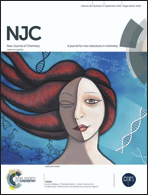 This month’s outside cover illustrates an article by Prof. Richard Keene (James Cook University, Australia) and co-workers in which they report important observations in the development of multinuclear ruthenium complexes as a new class of anticancer agents.
This month’s outside cover illustrates an article by Prof. Richard Keene (James Cook University, Australia) and co-workers in which they report important observations in the development of multinuclear ruthenium complexes as a new class of anticancer agents.
There has been little success in developing drugs that are active in cancer cell lines resistant to cisplatin. Consequently, there was a need in developing “non-classical” platinum complexes – complexes that can bind DNA differently than cisplatin and its analogues. Thus, multinuclear platinum complexes, where two or more platinum coordination units are linked by a variety of organic ligand bridges, represent a genuinely new class of anticancer drug.
This study shows that it should be possible to optimize cellular uptake and the kinetics of DNA binding, and thereby produce dinuclear ruthenium(II) complexes with significant clinical potential.
Multinuclear ruthenium(II) complexes as anticancer agents
Anil K. Gorle, Alaina J. Ammit, Lynne Wallace, F. Richard Keene and J. Grant Collins.
New J. Chem., 2014, 38, 4049-4059. DOI: 10.1039/C4NJ00545G.
________________________
Also discover the four Letters comprising this issue:
Nan Cao, Teng Liu, Jun Su, Xiaojun Wu, Wei Luo and Gongzhen Cheng.
New J. Chem., 2014, 38, 4032-4035. DOI: 10.1039/C4NJ00739E.
Jinwei Yin, Huimin Shi, Ping Wu, Qingyun Zhu, Hui Wang, Yawen Tang, Yiming Zhou and Tianhong Lu.
New J. Chem., 2014, 38, 4036-4040. DOI: 10.1039/C4NJ00767K.
Hongyu Zhen and Kan Li.
New J. Chem., 2014, 38, 4041-4044. DOI: 10.1039/C4NJ00768A.
Yang Liu, Jianan Zhang, Shoupei Wang, Kaixi Wang, Zhimin Chen and Qun Xu.
New J. Chem., 2014, 38, 4045-4048. DOI: 10.1039/C4NJ00816B.
Access the full issue here.










